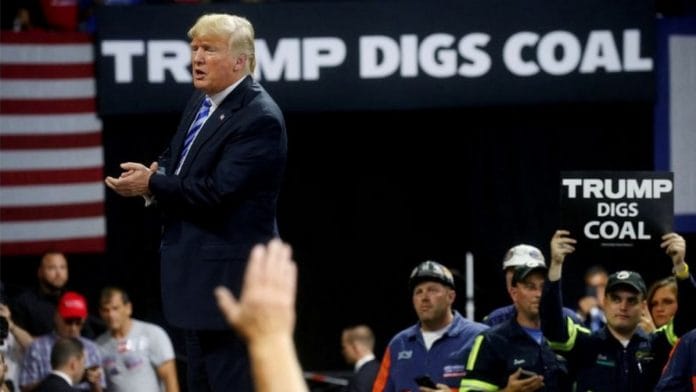New Delhi: Former US Secretary of State John Kerry warned on Wednesday that a growing number of American business leaders are retreating from green energy investments “out of fear” of political and legal repercussions under US President Donald Trump’s administration.
In an interview with The Financial Times, Kerry termed the trend as “shocking”, and said powerful business leaders who have been championing climate action and solutions are now concerned that they are under threat.
“It is not that they don’t believe [in climate change] or they don’t want to move forward. They are just scared,” he said.
Trump has long denied that climate change exists, and even described it as the “greatest con job ever perpetrated” in a speech at the United Nations General Assembly in September this year.
So what has this stance meant for corporate America, and why is Kerry saying ‘fear’ is now shaping decisions on clean energy?

Also Read: India set to be world’s hungriest energy market by 2035, says IEA report
What’s creating a climate of fear?
Kerry claimed that fear has clouded the judgement of corporate giants and even CEOs who were “bullish” about climate solutions had turned tail.
“The process of Donald Trump in the last months, coupled with the justice department, coupled with his vengeance programmes, has scared… a lot of people,” he told FT after an address at Chatham House in London.
A Reuters report earlier this week cited at least 470 targets of Trump’s campaign of retribution, ranging from media organisations and universities to prosecutors to civil servants. “Some were singled out for punishment; others swept up in broader purges of perceived enemies,” it said.
In such a scenario, backing what Trump has called a “green scam” might seem risky.
For Kerry, investors are responding not to science but to politics.
“The only hoax is in pretending otherwise,” Kerry said. “I’ve learned that, in an election for a time, you can bend the laws of politics. But believe me, no one, no president, no monarch, no one, can bend the laws of physics.”
What’s been the green energy fallout so far?
Under the Biden administration, the Inflation Reduction Act of 2022 drove over $115 billion in clean energy investments and created 90,000 jobs over the next two years.
In 2025, the Trump administration began reversing parts of that trajectory. In October, the US Department of Energy terminated 321 financial awards supporting 223 projects, claiming it had “saved” American taxpayers $7.56 billion. The administration has also accelerated the expiry of tax credits, and slowed clean energy permitting.
In October, the International Energy Agency cut its US wind growth outlook for 2025-30 by nearly 60 per cent and its solar forecast by almost 40 per cent.
Even with the Trump administration’s rollbacks, however, investment funds continue to see value in clean energy projects, driven by rising power demand from AI and electrification and long-term reductions in renewable costs, Reuters reported. It cited examples such as asset manager TPG’s purchase of solar developer Altus Power for $2.2 billion in April this year.
Also Read: How can India sustain growth in post-Trump tariff trading climate? ‘Innovation, bigger export basket
Corporates under fire
Trump hasn’t held back from lambasting CEOs of global giants when they’ve not aligned with his positions.
In August, the US President criticised Intel CEO Lip-Bu Tan, asking him to “resign” immediately on his social media platform TruthSocial. He alleged that Tan had a conflict of interest because of his ties with China.
Even Trump’s confidants were not spared, including Tesla CEO Elon Musk.
In July, Trump lashed out after Musk criticised his sweeping tax cut and spending bill, saying he would campaign against lawmakers who backed it. Trump replied on Truth Social that Musk survives on federal subsidies and “perhaps we should have DOGE take a good, hard, look at this.” He was referring to the Musk-led Department of Government Efficiency, which has since been dissolved.
“Elon may get more subsidy than any human being in history, by far, and without subsidies, Elon would probably have to close up shop and head back home to South Africa… BIG MONEY TO BE SAVED!!!” Trump wrote.
In May 2025, Trump said Apple would face a 25 per cent import tariff if its handsets were made outside the US. He singled out Apple CEO Tim Cook on Truth Social and told him not to build phones in India.
“I said to Tim, I said, ‘Tim look, we treated you really good, we put up with all the plants that you build in China for years, now you got build us. We’re not interested in you building in India’,” he wrote.
Company leaders have largely kept quiet during the Trump administration, even as attacks have extended more than once to philanthropist George Soros and LinkedIn co-founder Reid Hoffman.
Trump attacked Soros in September, stating that he was “a likely candidate” for prosecution. To this, Binaifer Nowrojee, president of the Soros-founded Open Society Foundations (OSF), responded: “This is not about George Soros. This is about the United States slowly losing its democracy bit by bit in ways that we’ve seen elsewhere in the world.”
(Edited by Asavari Singh)






